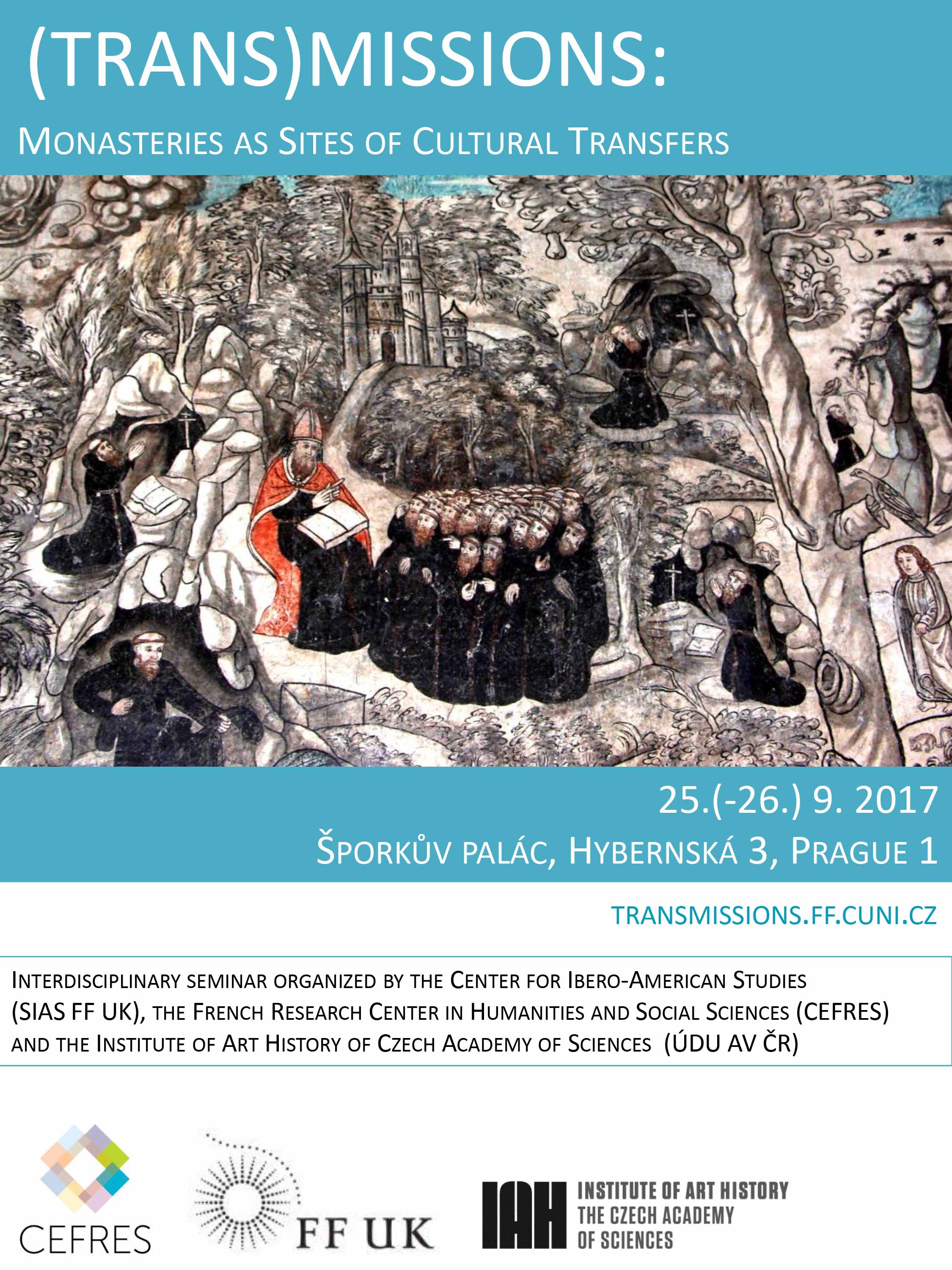
- akce již proběhla.
(Trans)missions: Monasteries as Sites of Cultural Transfers

The aim of the workshop is to set into focus the monastic space as a multifaceted research theme from a global and interdisciplinary perspective. We invite papers that address the questions how monastic institutions contributed to the flow and exchanges of cultural practices and how their role as cultural mediators shaped their material culture and spatial politics. The scope of the workshop has no timely, geographical or confessional limitations as it intends to generate dialogue between researchers from various disciplinary backgrounds.
For centuries, monasteries served as centers of education and culture. Literary works, sermons, translations and artefacts were created among their walls that never served merely as an impenetrable isolation from the outer world, but rather represented a conscious politics of structuring both the physical and the mental space. They kept contact not only with their closer environment, but also formed part of greater intellectual, spiritual and economic networks and interacted with different stakeholders of worldly power. They could serve as strongholds of cultural and religious missions that penetrated into new territories, triggered intercultural and interconfessional interactions and facilitated knowledge transfers, while their long-lasting presence in a territory could also ensure continuity and enables the investigation of long durée changes, reforms and renewals. Their evolvements and transformations unavoidably shaped both their inner spaces (including material culture and architecture), and the landscape around them and thus, they also contributed to the formation of such notions as identity, borders and migration.
Against this background, we invite papers on the following thematic fields:
- religious orders as stakeholders of social disciplining; confessionalization; colonization; cultural, religious and political missions; ecclesiastical and social reforms; etc.
- monasteries as mediators in the flow of ideas; material goods (artefacts, relics, precious materials, medicinal drugs, etc.); devotional, educational, healing practices
- spatial agenda of monastic institutions that shapes its closer environment materially (e.g. agricultural practices, setting up of parishes, chapels, shrines, etc.) and the perception the landscape in which they operate.
The workshop is designed primarily for young researchers — especially Ph.D. and postdoctoral students — aiming to explore the future perspectives of the aforementioned themes in an innovative way and to lay down the foundations of further cooperation beyond disciplinary and national boundaries. Simultaneously, it also aims to create a forum that features well-known scholars among its speakers and disseminates information about ongoing research projects, academic working groups and relevant publications. The Journal Ibero-Americana Pragensia also offers the opportunity to publish the presented papers. The language of the workshop is English, but abstracts submitted in other languages (German, Spanish, French) can be also accepted.
Conference Venue: Špork Palace, Hybernská 3, Prague 1, room nr. 303
25 September 2017 Monday
9.30–10.00 Registration
10.00–10.40 Opening Ceremony and introduction (organisers)
Markéta Křížová (Centre for Ibero-American Studies, Charles University)
Clara Royer (French Research Centre in Humanities and Social Studies)
Tomáš Winter (Institute of Art History, Czech Academy of Sciences)
10.40 – 12.10 Intrepretation and Context
Chair: Veronika Čapská (Department of General Anthropology, Faculty of Humanities, Charles University)
Martin Lešák, Monasteries on the Horizon: The Sacral Landscape Through the Senses of Medieval Pilgrims
Jana Králová, The Monastery Translation From the Contemporary Perspective
Jan Tesárek and Barbora Spalová, Other Time: Construction of Temporality in Benedictine Monasteries
12.10 – 14.00 Lunchbreak
14.00 – 15.00 Monastic Networks: Technology and Society
Chair: Jan Zdychinec (Department of the Czech History, Faculty of Arts, Charles University)
Szekér Barnabás, Whose Instructions? – Educational Orders, Administration, and Rules of Higher Schools in the 18th Century Kingdom of Hungary
Katalin Pataki, The Monasteries as Mediators of Medical Knowledge – Camaldolese Pharmacies of the Hungarian Kingdom and Austria
15.00-15.30 Coffee break
15.30 – 17.00 Devotion and Vocation: The Transition of Ideas
Chair: Markéta Křížová (Centre for Ibero-American Studies, Charles University)
Antonio Bueno, To Whom May Read This. The Prologue of Linguistic Works and Translations of the Dominicans as the Main Ideas for Reflection on Translation Theory
Monika Brenišínová, Mexican Monasteries and Processions. The Transmission of Ideas, Space and Time
Marcin F. Rdzak, Books of Enrollment to the Fraternity of the Scapular (1911-1946) from the Convent of Carmelite fFthers in Lwow. The Transition of DevotionalPatterns
17.00-17.30 Coffee break
17.30 Keynote Lecture
József Laszlovszky (Department of Medieval Studies, Central European University)
Transfer, Translation and Transmission of Knowledge in Monastic Networks –Research Directions and Approaches in the Study of Medieval and Early Modern Patterns
26 September, 2017 Tuesday
9.00-10.00 Arts and Architecture: Transferring the Forms
Chair: Lenka Panušková (Institute of Art History, Czech Academy of Sciences)
Pavel Štěpánek, El Escorial jako duchovní model českých a moravských klášterů ve světle současné interpretace (Hradisko, Kuks, Plasy)[El escorial as a Spiritual Model of Czech and MoravianMonasteries in theLightoftheContemporaryInterpretation (Hradisko, Kuks, Plasy)]
Jana Povolná, Sázava Monastery: St Procop, Scriptorium and the Church
10.00-10.30 Coffee break
10.30-12.00 Writing Monastery
Chair: Kateřina Bobková (Institute of History, Czech Academy of Sciences)
Renata Modráková, Benedictine St. George’s Monastery at the Prague Castle as a Crossroad of Medieval Cultural Trend and Ideas
Jan Kremer, Religious Identity and Order Discipline – Early Thirteenth-Century Bohemian Premonstratensians
Kristian Bertović, Glagolitic monks – Monastic Continuity and Glagolitic Script in the Medieval Croatia and the Istrian Peninsula
12.00-13.00 Lunchbreak
13.00 – 14.30 Presentations of Projects
Klášterní stezky (project of the Department of History and History Didactics, Faculty of Education, Charles University); http://www.klasterni-stezky.cz/
Visions of Community (VISCOM, University of Vienna); https://viscom.ac.at/home/
Religious Orders of Early Modern Hungary http://szerzetes.hypotheses.org/
Sources, Forms, and Functions of the Monastic Historiography in Early Modern Ages in the Czech Lands Zdroje, formy a funkce monastické historiografie raného novověku v českých zemích
Closing remarks
Lenka Panušková (IAH CAS), Katalin Pataki (CEFRES), Monika Brenišínová (SIAS FF UK)
15.30 The Emmaus Monastery
guided tour by Kateřina Kubínová



